Samuel Chapman Armstrong of the Hampton Institute writes to Richard Henry Pratt discussing an issue with Miss Fletcher, and also discusses how instructors at Hampton have reacted to Pratt's work at Carlisle.
Armstrong, Samuel Chapman
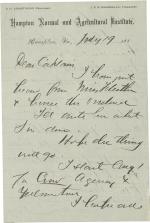
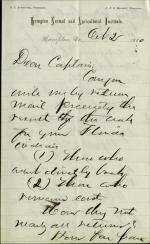
Samuel Chapman Armstrong of the Hampton Institute writes to Richard Henry Pratt asking for information about the former prisoners at Ft. Marion, and for more general information about Carlisle's students and operations.
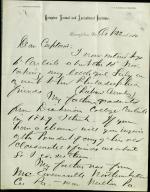
Samuel Chapman Armstrong of the Hampton Institute writes to Richard Henry Pratt about plans to visit Carlisle, as well as Dickinson College, where Armstrong's father Richard had attended.
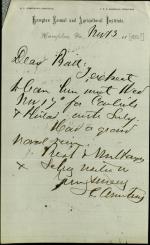
Samuel Chapman Armstrong writes to Richard Henry Pratt informing him of his departure and expected arrival date for a visit to Carlisle.
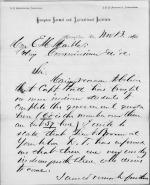
Samuel C. Armstrong informs Acting Commissioner of Indian Affairs E. M. Marble that Richard Henry Pratt is likely not bringing any new students to fill the quota of 68 Indian students at Hampton Institute. Armstrong continues to say that Lieutenant Brown at Yankton Agency knows of many Indian youth that would like to come to Hampton and could…
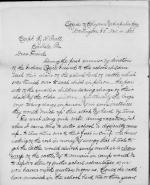
John D. Miles, Agent for the Cheyenne and Arapaho Agency, tells Richard Henry Pratt that his agency gave students cattle to take care of over vacation. As students did not know about the money and effort involved in caring for the animals, Miles relays a suggestion from John Holmes Seger (from the Arapaho school) that male students sell their…
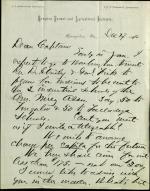
Samuel Chapman Armstrong of the Hampton Institute writes to Richard Henry Pratt requesting his involvement in lobbying for higher per capita funding for Indian students, and discusses recruitment for other schools.
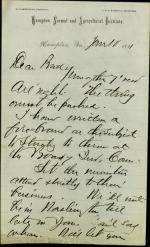
Samuel Chapman Armstrong of the Hampton Institute writes to Richard Henry Pratt discussing political lobbying issues with the Board of Indian Commissioners, likely over per capita funding concerns. Armstrong notes a planned lobbying trip to Washington.
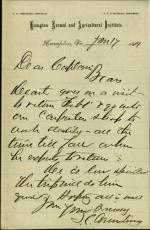
Samuel Chapman Armstrong of the Hampton Institute writes to Richard Henry Pratt informing him of a planned trip for Bear's Heart to return home for a month.
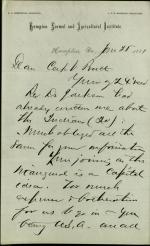
Samuel Chapman Armstrong of the Hampton Institute writes to Richard Henry Pratt discussing the party of Rev. Sheldon Jackson, as well as management concerns with their schools.
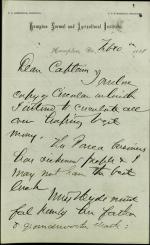
Samuel Chapman Armstrong of the Hampton Institute writes to Richard Henry Pratt enclosing a soon-to-be-distributed circular (missing from the file), and discussing both the Ponca party of visitors and Armstrong's hopes to take a delegation of students to Washington.
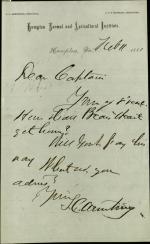
Samuel Chapman Armstrong of the Hampton Institute writes to Richard Henry Pratt asking for information about the return of Bear's Heart, including method and expense.
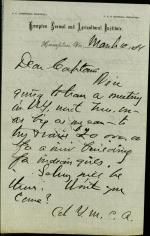
Samuel Chapman Armstrong of the Hampton Institute writes to Richard Henry Pratt inviting him to a fundraising event in New York to raise money for a girl's dormitory building at Hampton.
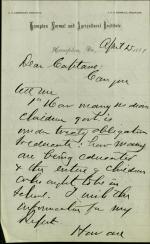
Samuel Chapman Armstrong of the Hampton Institute writes to Richard Henry Pratt requesting information on treaty obligations for the education of Indian children for a report he is writing. Armstrong also discusses upcoming visitors to Hampton as well as the results of a fundraising event for a girl's dormitory at Hampton.
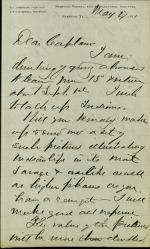
Samuel Chapman Armstrong of the Hampton Institute writes to Richard Henry Pratt informing him of a planned trip abroad to advocate for Native American education. Armstrong asks Pratt to send photographs of various aspects of Native American life for the purposes of his trip.
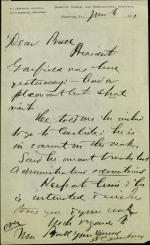
Samuel Chapman Armstrong of the Hampton Institute writes to Richard Henry Pratt sharing details of President James Garfield's visit to Hampton. Armstrong also informs Pratt of his desire to exhibit at a manufacturers' exhibition in Boston and requests that Pratt send him some of his industrial arts materials for the exhibit.
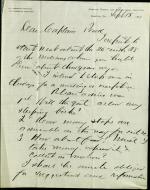
Samuel Chapman Armstrong of the Hampton Institute writes to Richard Henry Pratt asking for expense details for the return home of former Ft. Marion prisoners educated at Hampton over a three-year period. Armstrong also notes that the recovery of President James A. Garfield from an assassination attempt will be a benefit for them as they seek…
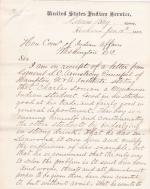
Green Bay Agency Indian Agent E. Stephens proposes transferring Charles Somains from the Hampton Institute to the Carlisle Indian School rather than having him return home. Stephens indicates that this is likely the best path for helping Somains and his mother.
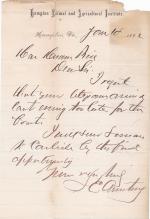
S. C. Armstrong acknowledges that he will transfer Charles Somains to Carlisle at the earliest opportunity from the Hampton Institute.
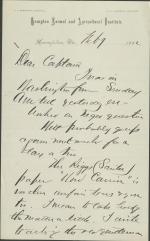
Samuel Chapman Armstrong of the Hampton Institute writes to Richard Henry Pratt discussing a recent trip taken to Washington, as well as an article about both men in the Word Carrier newspaper, published at the Santee Normal Training School. Armstrong suggested that either he or Pratt should write in response to the article.
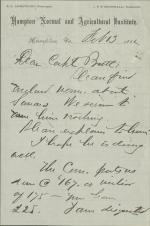
Samuel Chapman Armstrong of the Hampton Institute writes to Richard Henry Pratt about his newest per capita funding rate from the government, which he argues is too low.
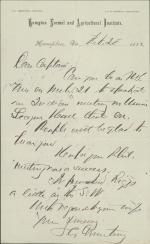
Samuel Chapman Armstrong of the Hampton Institute writes to Richard Henry Pratt asking him to speak at a meeting in Union League Hall in New York. Armstrong also mentions his views of Alfred Riggs.
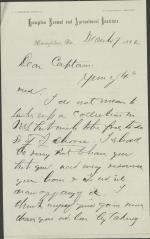
Samuel Chapman Armstrong of the Hampton Institute writes to Richard Henry Pratt discussing Armstrong's planned public talk in New York, as well as criticisms from Alfred Riggs and its impacts.
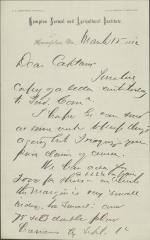
Samuel Chapman Armstrong writes to Richard Henry Pratt concerning an order for horseshoes from Hampton, which Armstrong notes has a very small profit margin.
Note: This is a partial letter, missing all but the first page.
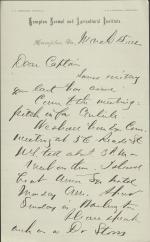
Samuel Chapman Armstrong of the Hampton Institute writes to Richard Henry Pratt again requesting him to attend a public talk in New York about the Indian schools.
